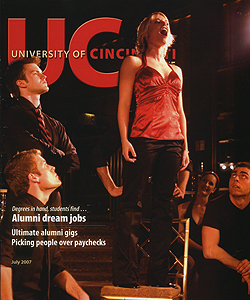Growth in 3-D movies
"You're going to see a lot more distribution of 3-D movies in another year or two. But they're not doing it on film. They're doing it on digital cinema, so the theater has to have a digital projector.
"We recently finished a couple of presentations on new 3-D stuff that we're working on, and the company included some 'Star Wars' stuff in the footage we reviewed. But in 3-D, those 'Star Wars' models look like models. We're all sitting there saying, 'Wow, does it really look like that?'
"One of the issues in 3-D is that everything is in focus. In a normal photographic shot, you're selecting where the focus should be. You're staging it so your eye will go there. If the faces are in focus, your eye stays on the faces. It's like putting a spotlight on somebody. Whereas in 3-D, to get it to play out right, everything is in focus. You find yourself looking all over the frame. So there's a lot yet to work out in 3-D."
The future of home movies
"We recently (fall '06) had a big trailer on the parking lot with demos of high-definition DVDs. Those really aren't on the market yet.
"Among people who are buying high-definition television sets, 99 out of 100 don't really have high definition. They have a 720 progressive picture (which refers to the lines of resolution). It's a good picture, but it's not high definition.
"When we finally get true high definition into the home, and we start pairing it with 50- or 60-inch screens, plus good sound systems, the question becomes: What's it going to take for you to spend $8 to $12 on a movie ticket? That's the business model we're looking at.
"I also don't think we'll have 3-D DVDs anytime soon. Some people say they can do it, but I haven't seen it. One reason to keep 3-D on the big screen is that no one wants to compete with 50-inch plasma screens. Again, how do you get people out of their homes to go to a movie?"
Music development
"I think the music side of putting a movie together is really underestimated. In my position, I get to see a movie from no music, to temporary music needed just to fill in something, to the first attempt putting in the score, to the final score.
"When you see footage without any music, it's flat. I don't care who is on the screen; it just leaves you thinking, 'Nobody is going to pay money to see this.' And you're right.
"But as soon as you begin putting in some music, it starts to have life. Some of the music is the wrong stuff, and we know that, but we're just putting something in so we can get reactions.
"Then the composers are hired. Sometimes we can be two months away from release and still be without a composer because we're waiting for a certain one. So you try to wait, but they're not always available in time.
"That's a producer's job. They're the ones who get to lose sleep over that.
"Lots of people say they could write a good song, but when they start watching footage and we say, 'We need six bars of good music right here,' that drives most people nuts. There's a lot to it. The list of people who make a lot of money in that field is very short."
Related article
Read feature story on Tom Bruehl

 Issue Archive
Issue Archive